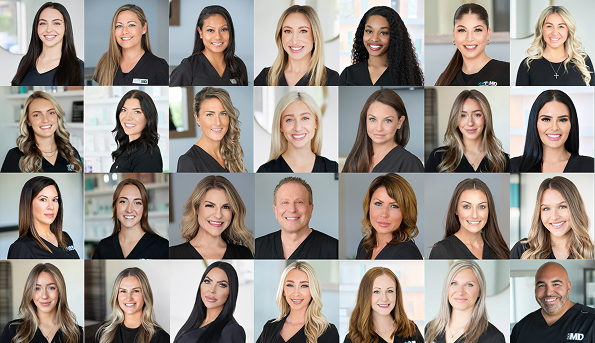Quick Links

- Our Treatments
- What Is a Weak Chin?
- Options for Fixing a Recessed Chin
- our team
- REAL PATIENTS. REAL RESULTS. REAL REVIEWS.
- Causes of a Weak Chin
- When Is Having a Weak Chin a Problem?
- How Do Non-Surgical Weak Chin Treatments Work?
- Non-Surgical Treatment vs. Genioplasty (Surgical)
- Non-Surgical Weak Chin Treatments from SkinMD
- Request an Appointment
- 10 LOCATIONS ACROSS THE GREATER BOSTON AREA
We offer weak chin treatments in the form of dermal fillers or FaceTite. Schedule a FREE consultation at a Massachusetts office near you.
Our Treatments
In the past, the only means of correcting a receding chin was chin augmentation surgery. Luckily, that’s no longer the case thanks to the non-surgical weak chin treatments at SkinMD! These non-invasive procedures use dermal fillers and FaceTite to deliver long-lasting results without the downtime of surgery.
Read on to learn more about these treatments, or schedule a free consultation at a SkinMD office near you.
What Is a Weak Chin?
A weak chin is another term for a receding jawline. You can recognize a recessed chin most easily in profile view, where you can see the chin slope from the bottom lip directly back toward the neck.
People with weak chins often have an underbite, a condition known as retrogenia. This can pose not only aesthetic concerns but also medical problems, such as difficulty breathing.
Options for Fixing a Recessed Chin
At SkinMD, we offer non-surgical weak chin treatments using dermal fillers like Juvederm®, Restylane, or Radiesse. These treatments take less than 20 minutes to inject and can deliver results that last for months.
After a set of injections, you will notice an improvement in the plumpness of your lower face area. This will strengthen your jawline, giving you a stronger profile.
For even more improvement, we can couple our dermal filler injections with FaceTite. This creates a natural look, reduces excess fat, and even smooths out fine lines and wrinkles around your jaw with minimal downtime.

our team
At SkinMD, we prioritize a physician-led approach to beauty. Our founder and medical director, Dr. Paul Flashner, ensures that our master injectors and aestheticians are trained in the latest techniques under his expert guidance. We leverage cutting-edge technologies to enhance your natural beauty while delivering exceptional results. The trust we cultivate with our patients through consistent, natural outcomes is what truly brings us joy.
MEET THE TEAMCauses of a Weak Chin
Most weak chins are caused by genetics and aging. However, there are some disorders and external factors that can lead to a recessed chin. These include:
- Facial trauma – Broken facial bones and deep cuts can heal in a way that leaves someone with a weak chin.
- Nager syndrome – This genetic condition can cause infants to have underdeveloped features around the face, arms, and hands.
- Hemifacial microsomia – Hemifacial microsomia is a congenital disorder that causes the face to develop asymmetrically. This condition commonly produces a receding chin.
- Treacher Collins syndrome – Treacher Collins syndrome is a rare group of conditions that impacts a child’s facial structure. Common symptoms of this syndrome include a cleft palate, a steeply angled jaw, and atypically shaped ears.
- Pierre-Robin syndrome (PRS) – PRS is a birth defect that occurs during fetal growth and affects the development of the jaw and other areas.
Weak chins caused by a congenital disorder or injury are typically treated with surgical procedures. However, a vast majority of recessed chins are not the result of an injury or disorder, and can be treated using less invasive methods.
When Is Having a Weak Chin a Problem?
Retrogenia can be an issue when it compromises your ability to breathe or eat. In these instances, opting for surgery may be necessary. However, if your weak chin is purely cosmetic, dermal fillers or FaceTite can deliver long-lasting results without the extensive downtime or risks of surgery.
Symptoms of Retrogenia
People who have a receding chin may experience the following symptoms:
- Trouble chewing, swallowing, and biting
- Jaw pain
- Snoring
- Speech disorders
- Difficulty closing their lips together
- Snoring
If you have any of these symptoms, along with diagnosed retrogenia, it’s worth seeking out a weak chin treatment.
Potential Complications of Retrogenia
Retrogenia can worsen over time if left untreated. Some complications that can emerge include:
- Gum disease
- Cavities
- Sleep apnea
- Malnutrition (in infants)
- Temporomandibular joint (TMJ) pain
These complications indicate a serious case of retrogenia and signal the need for immediate treatment.
Retrogenia vs. Retrognathia
Retrogenia and retrognathia are similar conditions that affect the jaw and chin area. Here’s a quick definition of each:
- Retrogenia – A small or recessed chin.
- Retrognathia – A recessed lower jaw, often coupled with a severe overbite.
Retrogenia can be a side effect of severe retrognathia. However, most weak chins are caused by factors other than retrognathia.
How Do Non-Surgical Weak Chin Treatments Work?
Non-surgical weak chin treatments reshape and enhance the jawline area by smoothing the skin, adding volume beneath the skin’s surface, and relaxing your neck and face muscles. These treatments increase the prominence of your chin and even eliminate sagging skin beneath the jaw. After treatment, patients are left with a bolder jaw, fewer wrinkles, and an altogether younger appearance.
Non-Surgical Treatment vs. Genioplasty (Surgical)
There are two main methods for treating weak chins: non-surgical options and a surgical procedure called genioplasty.
Genioplasty is generally reserved for more severe cases of retrogenia and retrognathia. It is an invasive surgical procedure that reshapes the chin by repositioning the lower jawbone or by adding a chin implant below the skin. To achieve a more dramatic improvement of a weak chin, many patients combine genioplasty with neck liposuction.
While effective, genioplasty has some drawbacks when compared to non-surgical options. Most notably, it takes several weeks to recover—two to eight weeks for the majority of patients. During recovery, patients typically eat a liquid and soft food diet for several days and must avoid athletic activities or vigorous exercise.
Non-surgical weak chin treatments, however, require little to no recovery time. Most patients go home directly after their treatment and can resume normal activities immediately. In some cases, there may be light swelling, redness, or bruising, which typically resolves in a few days.
Non-Surgical Weak Chin Treatments from SkinMD
If you’re unhappy with your profile, our non-surgical weak chin treatments can help! Our treatments are non-invasive, convenient, and require almost no recovery time. To get started, fill out the form and schedule a free consultation at your nearest SkinMD office.
Request an Appointment
Fill out the form below, or give us a call at (617) 829-9177 to schedule over the phone.
10 LOCATIONS ACROSS
THE GREATER BOSTON AREA
With ten locations across the greater Boston area, SkinMD is your local medspa. Find a SkinMD practice near you!
FIND NEAREST LOCATION





